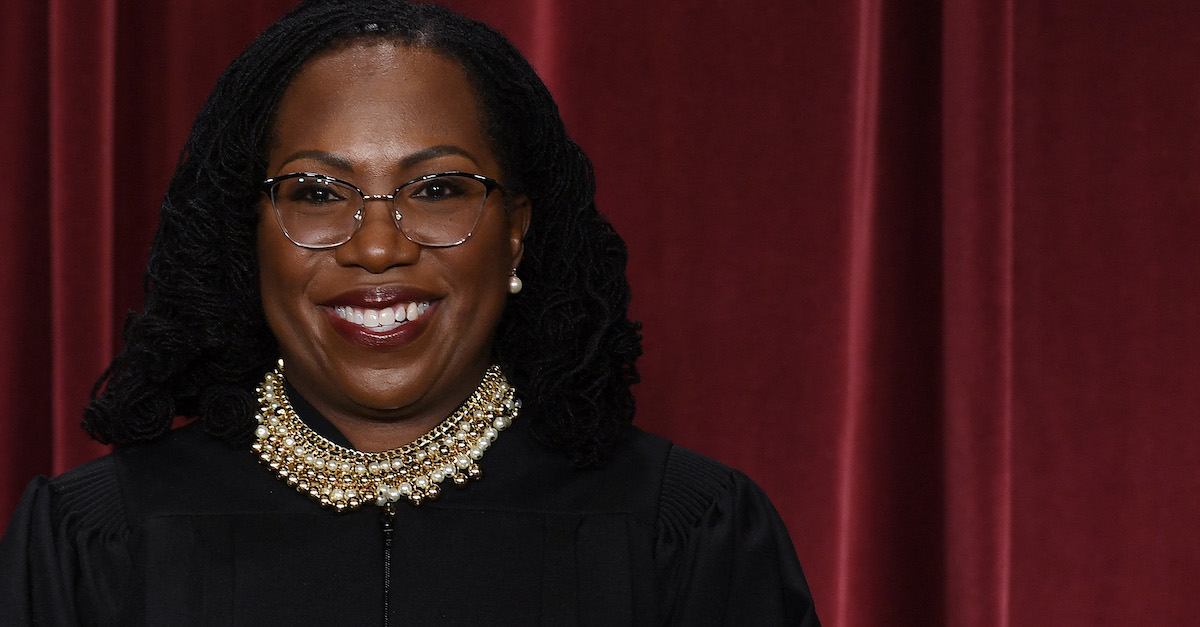Justice Ketanji Brown Jackson’s First Supreme Court Majority Opinion’ The Supreme Court of the United States held Tuesday that MoneyGram checks are “similar” enough to money orders to be covered under the Federal Disposition Act, meaning upwards of hundreds of millions of dollars in unclaimed funds housed in Delaware will go to the individual states in which the financial instruments were purchased.
Justice Ketanji Brown Jackson’s First Supreme Court Majority Opinion
The opinion is Justice Ketanji Brown Jackson’s first in an argued case as a member of the Supreme Court. It happened to be an original jurisdiction case, in which SCOTUS acted as a trial court directly deciding disputes between states.
The opinion’s syllabus narrowed down the question for the high court as follows: Which states “have the right to escheat two financial products sold by banks on behalf of MoneyGram: Agent Checks and Teller’s Checks (collectively, Disputed Instruments)”? As Law&Crime reported on October 2022 oral arguments in the consolidated original jurisdiction cases Delaware v. Pennsylvania and Wisconsin and Delaware v. Arkansas et. al, 30 states alleged that Delaware had no right to keep for itself certain “escheated” funds from uncashed MoneyGram checks.
READ ALSO: Nicaragua’s Prisoners Flew 222 To Freedom – But Ortega’s Not Going Anywhere
Pennsylvania first filed the case against Delaware in federal district court in 2016. Joining Pennsylvania were: Alabama, Arizona, Arkansas, California, Colorado, Florida, Idaho, Indiana, Iowa, Kansas, Kentucky, Louisiana, Maryland, Michigan, Montana, Nebraska, Nevada, North Dakota, Ohio, Oklahoma, Oregon, South Carolina, Texas, Utah, Virginia, Washington, West Virginia, Wisconsin, and Wyoming.
The SEC notes escheatment “refers to the process of turning custody of abandoned assets or accounts over to a state authority.” Under Jackson’s largely unanimous opinion, the aforementioned states emerge victorious in their claims of entitlement to MoneyGram funds.
Ketanji Brown Jackson Makes First Official Appearance: COVERGAE
“We hold that the FDA covers the instruments in question and thus that they should generally escheat to the State of purchase, pursuant to §2503,” Jackson wrote.
At the end of the 23-page opinion, Jackson wrote that there would be escheatment unfairness if Delaware were the only state allowed to stake a claim to the funds based on the technicality that MoneyGram lacked recordkeeping for creditor addresses.
“When a financial product operates like a money order— i.e., when it is a prepaid written instrument used to transmit money to a named payee—and when it would also escheat inequitably solely to the State of incorporation of the company holding the funds under our common-law rules due to recordkeeping gaps, then it is sufficiently ‘similar’ to a money order to fall presumptively within the FDA,” Jackson explained. “Such is the case with the Disputed Instruments. And nothing in the parties’ arguments, the Special Master’s Second Interim Report, or the record in these cases persuades us that the Disputed Instruments should be deemed ‘third party bank checks.””
The theory that the MoneyGram checks could be “third party bank checks” excluded from coverage under the FDA was floated after an oral argument by the court-appointed special master, Senior U.S. Circuit Judge for the Second Circuit Judge Pierre N. Leval. Though Leval’s May 2021 report found that Delaware was wrong to claim the uncashed MoneyGram checks for itself, the Supreme Court opinion’s syllabus pointed out, the special master later modified that conclusion.
“Following oral argument in this Court, he reassessed that decision and issued a second report, concluding that many of the Disputed Instruments were or could be ‘third party bank check[s],’ which are excluded from the FDA and would generally escheat to Delaware under the circumstances,” the syllabus said.
The Supreme Court rejected that special master conclusion, and Delaware—a state that typically rakes in major revenue from unclaimed property—unsuccessfully argued that it was entitled to keep the funds at issue because MoneyGram is incorporated in the state.
Only Part IV–B of Jackson’s otherwise unanimous majority opinion was 5-4. She was joined in Part IV–B by Chief Justice John Roberts, Justice Sonia Sotomayor, Justice Elena Kagan, and Justice Brett Kavanaugh.
In November, Justice Jackson penned a dissent over the court’s denial of certiorari in a death penalty case. The next month, she joined Justice Neil Gorsuch’s dissent warning the Supreme Court against playing “policymaker” in the high-profile Title 42 dispute.
Pennsylvania Treasurer Stacy Garrity said in a statement that the upshot of the ruling is “residents will have a real opportunity to reclaim millions of dollars in unclaimed property.”
Slamming Delaware’s attempt at gaining an “unfair windfall,” Garrity celebrated the Supreme Court decision for striking a “strong blow in favour of consumers.”
Have a tip we should know? [email protected]
READ: Twitter CEO: Billionaire Elon Musk Hopes To Have Twitter CEO Toward The End Of Year


